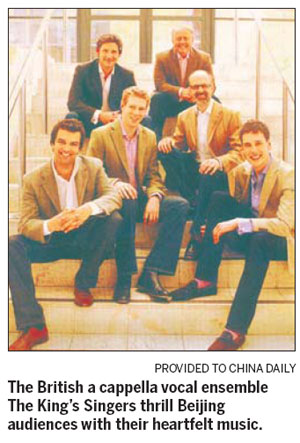King's Singers - right royal treat
Updated: 2011-12-27 11:11
By Pauline D. Loh (China Daily)
|
|||||||||
As a young DJ with a radio station in Hong Kong, I had to host a late-night easy listening program called Oldies But Goodies. It came on at 11 every night and my instructions from the program director were: No rock, no Beatles, nothing loud.
My favorite fallback album from the library then was a well-worn vinyl record with six fresh-faced, soap-scrubbed young men in Oxfords grinning engagingly from the cover. They were The King's Singers, and they sang a cappella in perfect harmony. They also made pleasing my bosses so much easier.
That was at least 30 years ago, and the group had already been singing for more than 10 then. Fast-forward to 2011, when they celebrated their 43rd anniversary, with their popularity no less than it has always been.
When a group stays evergreen with no sign of fading, you sit up and want to know more about the formula for success. For the King's Singers, it has always been perfect harmony - and proof that the most beautiful and versatile instrument is the human voice.
When The King's Singers toured China recently, they stopped in Beijing for a one-night performance at the Concert Hall of the National Center of the Performing Arts. The acoustics in the hall are excellent, as we all know, and The King's Singers exploited all the advantages.

Four simple music stands stood in the middle of the bare stage, in a concert hall where not a single musical instrument was in sight - until six men in suits strode onstage.
Even the gleaming metal pipes of the Concert Hall's organ seemed mute before the glorious music that poured forth from counter tenors David Hurley and Timothy Wayne-Wright, baritones Christopher Gabbitas and Philip Lawson, the lone tenor Paul Phoenix and bass Jonathan Howard.
Lawson also arranges much of the group's music, including the program they sang in Beijing.
It was a Christmas collection of past and present, with interludes from Spain and a section that the group simply titled Joy to the World. The songs were in English, Latin, German, Spanish and French, much of which was all Greek to the mainly Chinese audience. But they were there for the music, and every note from every man was pure music.
Christmas present was a set of "modern" Christmas carols that are less often heard, including the joyful Gabriel's Message, the plaintive Lullay My Liking and the poignant Mary's Lullaby.
Classical renditions were mixed with playful arrangements. For example, would you have ever imagined a musical marriage between God Rest Ye Merry Gentlemen and Dave Brubeck's Take Five? Or Jingle Bells in six-part harmony and more twists and turns than Santa's sleigh ride through the narrow fjords?
As one of the members quipped just before they sang. "I know you'll want to sing along. Don't!"
No one could have kept up if they tried.
It was truly a feast for the ear and the audience could not get enough. Anyone who has ever accused a Chinese audience of being frigid should have sat through the three exuberant encores the King's Singers came back onstage for.
And finally, when the audience reluctantly left, many were humming and singing as they went through the doors and out into the freezing winter night.
Music needs no translation, and The King's Singers are linguists in every sense of the word. They have traveled far since six choral scholars from King's College in Cambridge began singing together in 1968.
The members have changed through the decades, but the ensemble's message is still loud and clear: the best music comes right from the heart - and is answered with the heart.